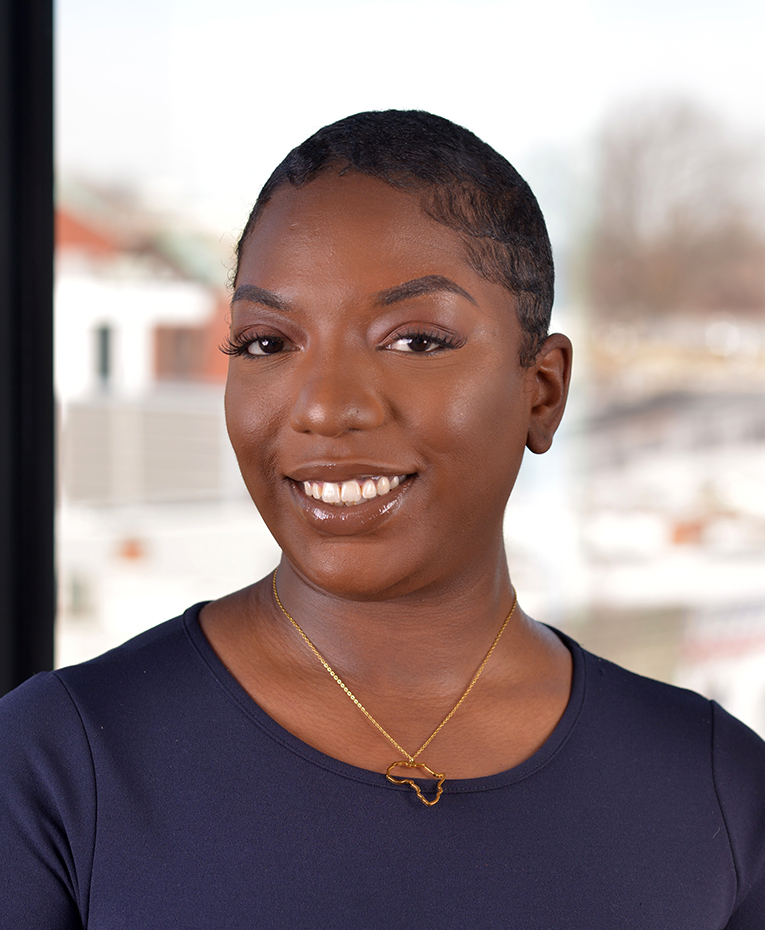June 03, 2025
January 31, 2024

As a first-generation Nigerian American, my background is somewhat of a departure from that of the typical lawyer. Nigerian parents, however—including many in my community—can be notorious for encouraging their children to pursue what they call the “big four”: a career as a doctor, nurse, lawyer, or engineer. Fortunately for me, I’ve wanted to be a lawyer since the fifth grade, inspired by my love for reading, arguing, and true crime stories.
Despite my parents’ strong encouragement to pursue my dream of becoming a lawyer, I didn’t know any lawyers growing up. There were no lawyers on either side of my family. But I vividly remember a portrait of Johnnie Cochran that my father hung in our home—that was the extent of my exposure to Black lawyers.
My first time meeting a Black lawyer was near the end of my senior year of college when I interviewed a university lawyer about her experience as a Black woman in the law. She spoke about the mental health challenges many lawyers face and the disparate impact on Black lawyers relating to factors such as imposter syndrome and a lack of support and sense of belonging.
I wasn’t aware of these challenges facing Black lawyers, but after matriculating at a predominantly white college, I was acutely aware of how such an environment can exacerbate such outcomes for people from underrepresented backgrounds. Her words of wisdom stuck with me and strongly influenced my decision to attend a historically Black law school.
Part of my education at Howard University School of Law focused on the underrepresentation of Black lawyers in the profession and our role in improving those circumstances. The fact that Black lawyers made up less than 5% of the profession was a constant refrain, along with the reminder that the percentage had remained stagnant over the last decade. These statistics are reflected in my reality.
As a Black woman lawyer, I feel a sense of duty to help improve diversity in the legal field. It has been a fulfilling journey to volunteer with programs such as Just The Beginning–A Pipeline Organization, which is dedicated to increasing underrepresented communities’ access to the legal field. I felt honored to hear how the young Black girls in the program admired my authenticity as a young Black woman in this predominantly white and male profession. My visibility made them feel seen, deepened their interest in pursuing a legal career, and gave them hope to succeed as both lawyers and their authentic selves.
But improving diversity in the legal field doesn’t end at helping more young people to see themselves as future lawyers—it is a continuous journey to make sure diverse attorneys have meaningful career opportunities once they enter the workforce. Strategic partnerships between law firms and organizations that use bold approaches to legal recruitment can achieve real change.
My current employment exemplifies this. After graduating from law school, a friend encouraged me to apply to a talent management solution firm focused on placing diverse junior lawyers in law firms and corporate legal departments. The recruitment firm assesses each candidate holistically, provides an intensive legal “boot camp” before the placement process begins, and offers support and resources.
This assessment and training process is intended to build confidence for law firms that might otherwise fear the unknown inherent in employing non-traditional candidates or assessing candidates on the basis of non-traditional criteria. Throughout this process, I realized that my previous desire to avoid working at a law firm arose from my own fear of the unknown and ending up at the wrong firm for me.
I was eventually placed at Gilbert LLP through this process. Despite considerable efforts over time, they had struggled to build a diverse legal team that reflected the firm’s values and goals, so they decided to seek outside assistance and partner with the recruitment organization. I was the second lawyer placed at Gilbert through this partnership, and both of us have since been hired into the firm. Gilbert has also welcomed three more lawyers through this program.
Improving diversity in the legal profession won’t happen overnight, but it’s important for firms and diverse candidates to take the first steps toward the collective effort. Firms shouldn’t be afraid to seek assistance or alternative approaches in building diverse teams, and the same goes for diverse candidates seeking employment.
Now, I’m the first lawyer in my family, affectionately referred to as the “family lawyer” by my family and friends. My older sister is currently expecting her first child and recently shared a dream where her future son says that he wants to “be a lawyer just like his Auntie Ife.” I feel privileged to serve as a representative of change and to ignite and inspire transformation in the profession as a pathway for future Black lawyers.
Reprinted with permission of Trial® (February 2024) Copyright ©2024 American Association for Justice®, Formerly Association of Trial Lawyers of America (ATLA®) www.justice.org/aaj-publications
Gilbert LLP is a Washington-based law firm specializing in litigation and strategic risk management, insurance recovery and complex dispute resolution.
